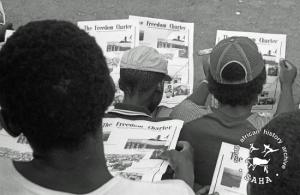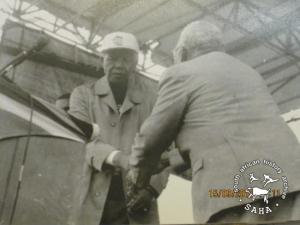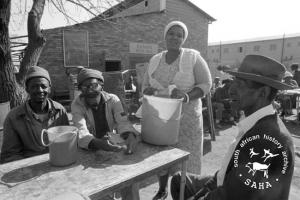 On 19 October 1977 the government banned all the BC-aligned structures and newspapers opposing it like The World. Furthermore, it arrested political activists and journalists. In Tembisa, James Moleya was one of the activists who were arrested. It was against this backdrop that members of the BC began to debate whether the time had not come for them to turn to the armed struggle. Although few activists from Tembisa were able to flee the country into exile, the majority remained in the country and focused their efforts on political mobilization.
On 19 October 1977 the government banned all the BC-aligned structures and newspapers opposing it like The World. Furthermore, it arrested political activists and journalists. In Tembisa, James Moleya was one of the activists who were arrested. It was against this backdrop that members of the BC began to debate whether the time had not come for them to turn to the armed struggle. Although few activists from Tembisa were able to flee the country into exile, the majority remained in the country and focused their efforts on political mobilization.
Just like in the 1960s after the banning of black political organizations, the government's offensive against the BC movement had managed to instill fear in many people. It was for this reason that Jaki Seroke, who later joined the PAC, established a reading club to continue mobilizing people.
Seroke recalls:
"In 1978 and 1979 we had Babupi (The Creators, in SeSotho) reading club. We were using it as a front to mobilize, because we felt that we needed to mobilize people and conscientise them. We would give them books. I was already writing for newspapers like The Voice, and also writing poetry to mobilize. We used to go to the Germiston train station ... to give people material. We were together with Thlaki Lekganyane, Mogale ... There were many of us."
- Jaki Seroke 1
Two particular publications sharpened the ideological divisions in Tembisa. First, it was the booklet that Jaki Seroke distributed amongst members of his reading group. This booklet was very critical of the ANC leadership.
Greg Malebo remembers:
"In 1979, Jaki Seroke came with a book called Naledi or something. It was a PAC book. It really lambasted Oliver Tambo and we were drawn to it and we discussed it. [It argued] ‘Look, Oliver Tambo is globetrotting, he's not doing anything. Why is he not in Zambia?' Because we had influence in Tembisa we were now recruiting for the PAC. We would have a supply from Jaki [Seroke]."
Clearly the message in the booklet implied that Tambo had forsaken the struggle and was enjoying himself travelling around the world. This view was summarily quashed after another publication was distributed in the township to explain the reason for Tambo's world-wide travels.
Lazarus Mawela recalls:
"After the banning of the BC-aligned formations and the newspapers, the arrest of people like James Moleya and the death of Biko, people started debating the issue of armed struggle. Some were saying we need to fight. It was at this stage that ideological differences surfaced. The ANC and PAC (Willie Modupo and Bra David Makgaga, Jaki Seroke followed the PAC). Mnyele had links with the ANC. I was given a book titled The ANC Speaks by Matthew Moomakwe. But at this stage we could no longer meet freely because of the security police's focus on some of our members. The book outlined the Morogoro conference and the four pillars of struggle by the ANC."
However, it was the contentious debate around the Freedom Charter that sharpened the ideological divisions more. Seroke had come across a copy of the Freedom Charter, which was banned at the time, and distributed copies of it to the members of his reading group.
He recalls:
"...at this stage there were great debates around the position of the ANC: what does the ANC stand for? And I came across the ANC's Freedom Charter and I tried to use that as part of our discussion of the ANC with my colleagues and friends. These were the young guys in Tembisa who were in the Black Consciousness that I was trying to recruit. The idea was to ask the question ‘do we go with it?' and what was the Freedom Charter all about? I rewrote the Freedom Charter - word for word, and then made copies for others to read and understand. Somehow news got to the security police that there were copies of the Freedom Charter doing rounds and I was responsible."
- Jaki Seroke 1
Greg Malebo, who received a copy and was involved in the discussions about the objectives of the Freedom Charter, remembers that they rejected it.
In his words:
"We were lambasting the Freedom Charter like you won't believe. We were young and thought it was a waste of time. The question of international mobilization, we didn't care about that."

Malebo's position on the Freedom Charter was finally altered by Steve Bopape, the owner of ‘Steve's Place', a shebeen in Tembisa.
Malebo and the other members of his reading club had become regular patrons at the shebeen.
Malebo recalls that Bopape would listen to them arguing about the Freedom Charter, particularly the preamble ‘South Africa belongs to all who live in it'. Those who opposed the Freedom Charter contended that South Africa cannot belong to all who live in it but instead should belong to Africans.
Malebo takes up the story:
"Steve came up and [told] us the importance of the charter. [He] would in a subtle fashion ma[ke] us aware of seeing the importance of the role played by the ANC. I must be honest those discussions shaped my political thinking until today in terms of the organization that I had to follow."
The reading group was split into those who supported the ideals of the ANC and those of the PAC. Mawela and Malebo, for example, aligned themselves with the ANC, and Seroke, Thlaki Lekganyane, Willie Modupi and David Makgaga with the PAC. Because the ANC and PAC were still banned organizations, those who supported their ideas and politics could not come out and declare their support for them publicly. They continued to be active in the BC movement.
Amidst the contestations and debates, two national political organizations were formed in 1979: the Azanian People's Organisation (Azapo) and the Congress of South African Studnets (Cosas). From the outset Cosas adopted the Freedom Charter as its guiding document. As part of the BC movement, Alex Segale, Greg Malebo and Lazarus Mawela represented Tembisa as delegates at the launching of Azapo in Hammanskraal, part of the Bophuthatswana Bantustan (today North West Province). After the launching conference, they returned home and helped establish the branch of Azapo in Tembisa. This branch was launched in 1980 at the Lutheran Church in Thiteng section.55 Members of Azapo with ANC leanings not long left AZAPO. Greg Malebo claims that this was after they had received instructions from members of the ANC in exile. He remarks: "Alex Segale and Lazarus [Mawela] were recruited into the underground structures of the ANC and they informed us that the instruction from exile was that we should not be part of AZAPO, but become involved in civic organization.
Already in the period 1978-79 the ANC had an MK base in Botswana. The Botswana Senior Organ (SO), which brought together the most senior political and military leaders, was led by Henry Makgothi, who was succeeded by Lambert Moloi. Other leading figures in this SO during this period included Billy Masetlha, Wally Serote and Thabang Makwetla.57 In 1980, some of the expelled members of Azapo were visiting Botswana to discuss and receive instructions from the members of the ANC in exile.
Mawela recalls:
"So after a while we took a decision to go and speak to Mnyele in Gaborone, Botswana. Alex Segale, whose younger sister later got married to Mnyele, was the first to go there. Segale returned and briefed us; then a few of us went to talk to him. It was myself, Segale and Thabiso Radebe (but he was very young then). We did not all go at once. We went there individually and per an invitation by Mnyele. I first went to meet him in 1980. We were instructed to prepare for the formation of a ... [United Front]. Besides that he wanted to know if I was organizing the workers where I was working. He would also give me ANC's publication and pamphlets to distribute in Tembisa. I joined the Chemical Industrial Workers Union."
Similarly, Seroke, who was also once a member of Azapo in Tembisa, began connecting with the PAC in Lesotho. Seroke remembers that it was after he had been arrested and charged for being in possession of a banned publication that he traveled to Lesotho to meet with the leadership of the PAC there:
"Many members of the ANC felt that because I had been arrested for being in possession of the Freedom Charter, I was one of them, or I should join them. So, I felt that in order not to be misunderstood I should meet with the PAC. I went to Lesotho where I met with Sabelo Phama for the first time in Sidzamba's office. Sidzamba said, ‘We're going to give you a task and Sabelo would come and talk to you about it'. Sabelo, who requested that I refer to him as ‘Victor' - his code name in exile - put me through the basics of underground work - for example, how a cell system operates and what does it mean to operate underground. The idea was that we would form an underground network of cells inside South Africa."
- Jaki Seroke 1
These initial links with the ANC and PAC in exile laid the foundation for underground operations in the 1980s.
NEXT: Tembisa in the 1980s - Civic structures
1. Interview with Jaki Seroke, conducted by Tshepo Moloi, Cosmo City, Johannesburg, 11 November 2011 [Tshepo Moloi’s private collection].


